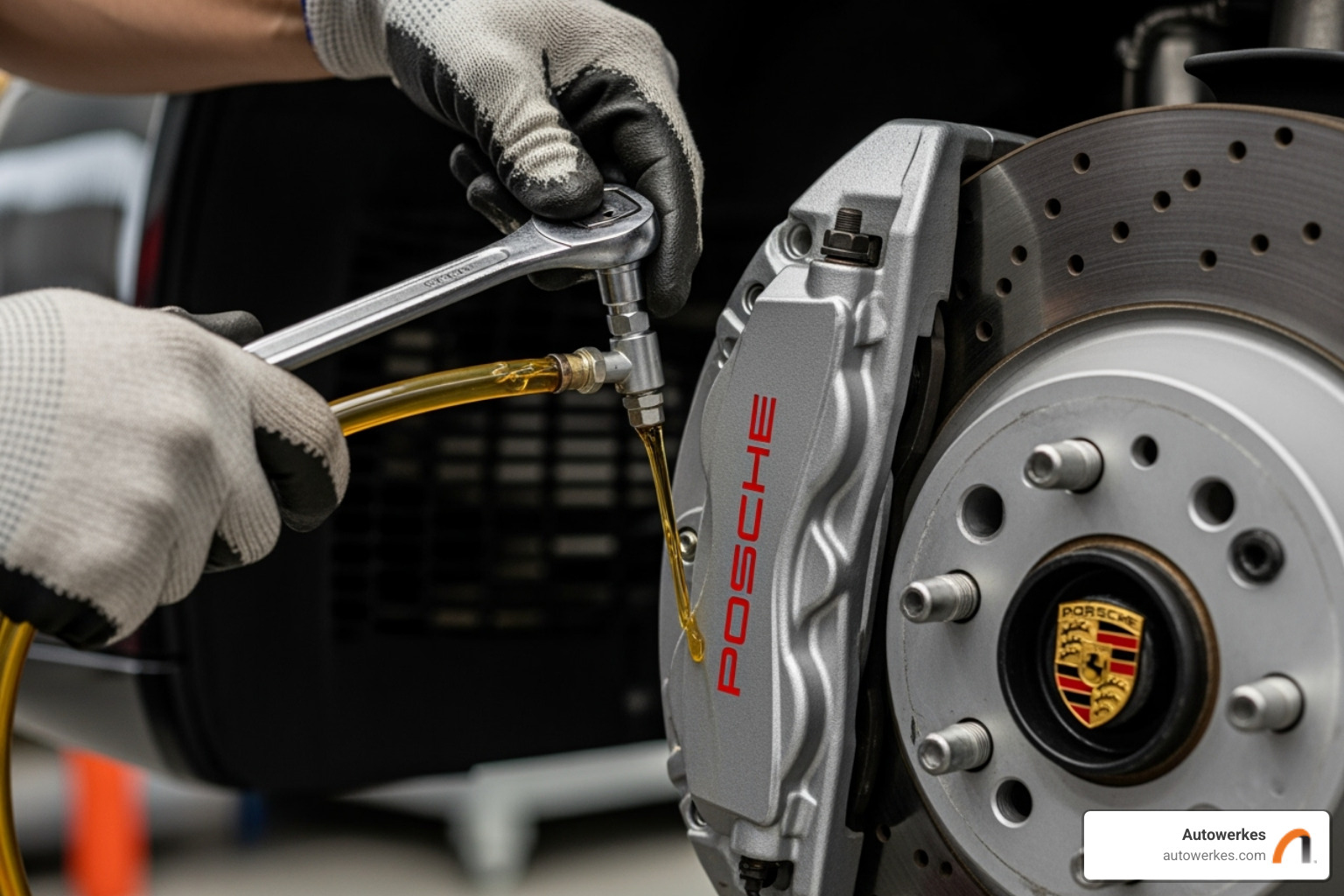Brake Fluid Light On? What Every BMW Owner Needs to Know

Why Your BMW's Brake Fluid Matters
A BMW brake fluid change is a critical service that protects your braking system and ensures reliable stopping power. If you've seen the warning light or your service reminder is due, you might wonder if it's truly necessary. The answer is yes.
Quick Answer: BMW Brake Fluid Change Essentials
- Recommended Interval: Every 2 years or 30,000 miles
- Fluid Type: DOT 4 Low Viscosity (LV) for most modern BMWs
- Why It Matters: Brake fluid absorbs moisture, lowering its boiling point and risking brake fade.
- Warning Signs: Dark fluid, spongy brake pedal, reduced stopping power.
- Professional Service: Requires a proper bleeding procedure and a scan tool for the ABS system.
Brake fluid is hygroscopic, meaning it absorbs moisture from the atmosphere. Over time, this contamination lowers the fluid's boiling point. During hard braking, the fluid can boil, creating vapor bubbles in the lines. Since vapor compresses, this leads to a "spongy" pedal feel and a dangerous loss of braking power known as brake fade.
Furthermore, moisture causes internal corrosion in brake lines, calipers, and the master cylinder, turning a simple maintenance task into a potentially expensive repair if neglected.
At Autowerkes, we understand that proper brake fluid maintenance is non-negotiable for the safety and performance of your BMW.
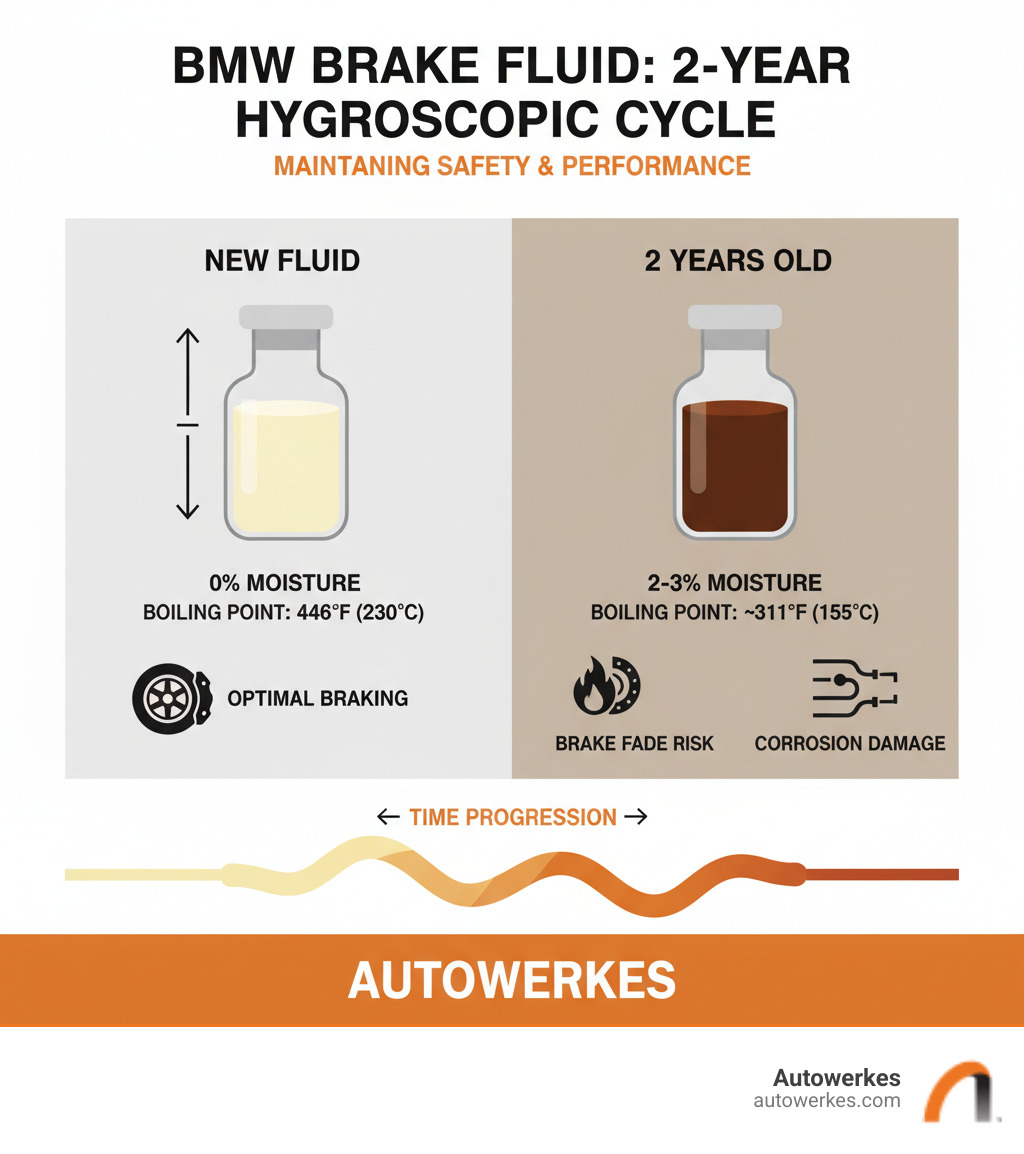
The Complete Guide to a BMW Brake Fluid Change
Understanding when and how to properly service your BMW's brake fluid can feel overwhelming, but it doesn't have to be. Let's walk through everything you need to know about keeping your braking system in top condition—from recognizing the warning signs to understanding what happens during a professional service.
When and Why to Change Your Brake Fluid
A regular BMW brake fluid change is essential for safety, even if the system seems sealed and the fluid isn't consumed like oil.
BMW's Recommended Service Interval
BMW recommends changing brake fluid every 2 years or 30,000 miles, whichever comes first. Your car's service reminder will alert you, but it's important to know that the fluid degrades even when the car isn't driven often. Moisture still seeps in through microscopic pores in the brake hoses over time.
Recognizing the Warning Signs
Beyond the service reminder, your BMW may show physical signs that the fluid needs changing:
- Spongy or Soft Brake Pedal: If the pedal feels mushy or sinks toward the floor, it could be due to air or boiled, contaminated fluid in the lines.
- Reduced Stopping Power: The car takes longer to stop, or you need to apply more pedal pressure for the same braking response.
- Dark Fluid Color: Fresh brake fluid is clear to light yellow. As it absorbs moisture and contaminants, it darkens to brown or black, a strong visual cue that service is overdue.
- Brake Warning Light: If this light illuminates on your dashboard, seek service immediately.
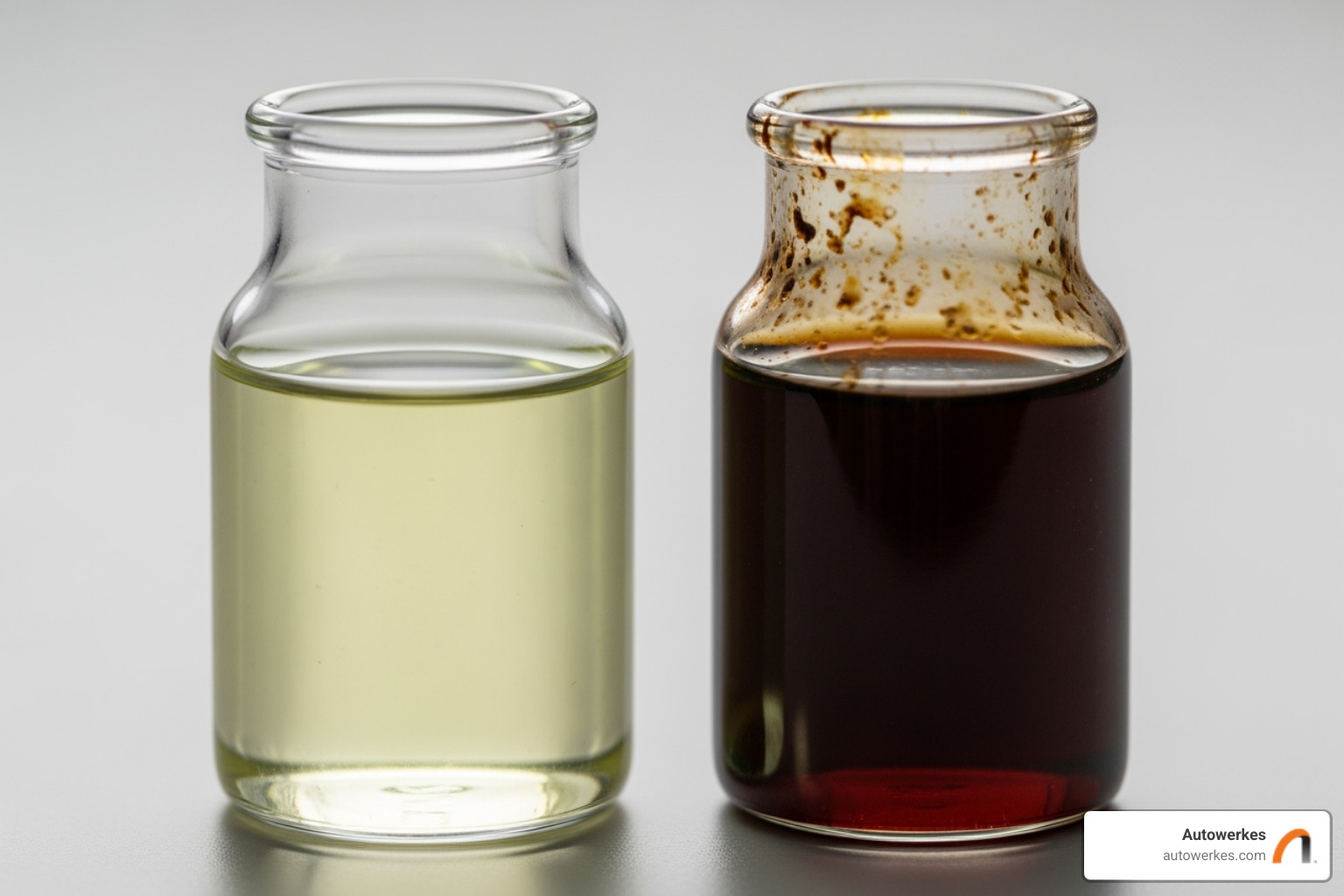
The Hidden Dangers of Old Fluid
As explained earlier, brake fluid is hygroscopic (it absorbs water). Water has a much lower boiling point (212°F) than fresh DOT 4 fluid (around 446°F). As moisture content increases, the fluid's boiling point drops. Under heavy braking, this contaminated fluid can boil, creating vapor in the lines. This vapor compresses, leading to brake fade—a sudden and dangerous loss of braking power.
Additionally, moisture causes internal corrosion of expensive components like the ABS module, calipers, and master cylinder. Sticking to BMW's recommended service interval is the best way to prevent these issues before they start.
For more detailed information on maintaining your BMW's braking components, visit our dedicated page: More info about our brake services.
What Type of Brake Fluid Does My BMW Need?
Using the correct brake fluid is essential for your BMW's performance and safety. These precision systems demand specific fluids to function correctly.
BMW's Specified Fluid: DOT 4 Low Viscosity
Most modern BMWs require DOT 4 Low Viscosity (LV) brake fluid. The "Low Viscosity" property is critical for the rapid response of sophisticated systems like Dynamic Stability Control (DSC) and the Anti-lock Braking System (ABS). These systems use narrow passages and valves that require a thin fluid to react instantly, especially in cold weather.
Always consult your owner's manual for your model's exact specification, or ask our team at Autowerkes.
Risks of Using the Wrong Fluid
Using an incorrect fluid can cause expensive damage and compromise safety.
- Component Damage: The wrong chemical compounds can cause rubber seals to swell or deteriorate, leading to leaks and master cylinder failure.
- System Clogging: Mixing incompatible fluids can create a gel-like sludge that clogs brake lines and the ABS modulator, potentially requiring component replacement.
- Compromised Safety Systems: Standard DOT 4 fluid is too thick for BMW's ABS. During an emergency, it can't cycle through the valves fast enough, reducing the system's effectiveness and increasing stopping distances.
At Autowerkes, we use only genuine BMW-approved fluids or their exact equivalents to ensure optimal performance and prevent costly problems.
BMW Brake Fluid Change: DIY Considerations
While a DIY BMW brake fluid change may seem tempting, it's more complex than on a typical vehicle due to BMW's sophisticated engineering.
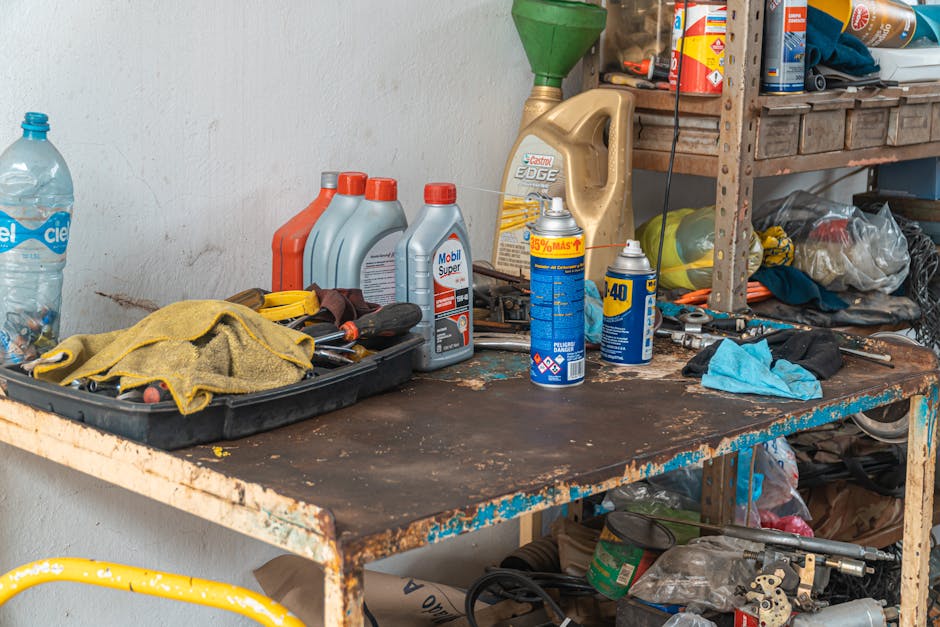
The Challenge for DIYers
A proper brake fluid change requires specialized tools like a pressure bleeder, wrenches, and jack stands, not to mention a significant time commitment. However, the biggest hurdle for a DIY job on a BMW is the ABS module.
Bleeding the calipers alone does not remove the old, contaminated fluid trapped inside the ABS unit's complex network of valves. To perform a complete flush, a specialized diagnostic scan tool is required to cycle the ABS pump and valves, forcing the old fluid out.
Without this step, a significant amount of contaminated fluid remains, mixing with the new fluid and compromising the entire service. This leaves your advanced safety systems vulnerable to corrosion and failure. Other risks include spilling corrosive brake fluid on paint, stripping bleeder screws, or introducing air into the system, which results in a spongy pedal and unsafe braking.
For a system as critical as your brakes, professional service provides peace of mind that the job is done completely and correctly.
To explore more about maintaining your BMW and understanding its intricate systems, check out our blog: Read more about BMW maintenance tips.
The Professional BMW Brake Fluid Change Procedure
At Autowerkes, our certified technicians follow a comprehensive procedure to ensure your entire braking system is serviced correctly for peak performance and safety.
1. Correct Bleeding Sequence and Power Bleeding
We use professional-grade power bleeders to apply constant, consistent pressure to the system. This prevents air from entering the lines and ensures a thorough flush. Our technicians follow the manufacturer-specified bleeding sequence, starting with the caliper furthest from the master cylinder (passenger rear) and working toward the closest (driver front). This methodical process pushes all old fluid, contaminants, and air out of the system.
2. The Critical Scan Tool Step for the ABS Module
This is what separates a professional BMW brake fluid change from an incomplete one. The ABS module traps old fluid that cannot be removed by simply bleeding the calipers. We use a specialized diagnostic scan tool to communicate with your BMW's computer and electronically cycle the ABS pump and valves. This forces the trapped, contaminated fluid out of the module and into the brake lines, where it can be flushed completely from the system. Without this step, your new fluid is immediately contaminated, and the ABS system remains at risk of corrosion and malfunction.
3. Final Verification
After flushing the entire system, we verify that the brake pedal is firm and responsive, confirming that there is no air in the lines and the system is performing optimally. This attention to detail ensures your BMW is safe and ready for the road.
To learn more about the full range of expert services we offer for your luxury vehicle, visit: More info about our expert services.
Ensuring Peak Performance: Your Next Steps
A regular BMW brake fluid change is a critical service that protects your investment, performance, and safety. Don't wait for warning signs like a spongy pedal or dark fluid; proactive maintenance is key.
Key Takeaways:
- Follow the Interval: Change your brake fluid every 2 years or 30,000 miles, as recommended by BMW.
- Use the Right Fluid: Always use DOT 4 Low Viscosity (LV) fluid to protect sensitive ABS and DSC components.
- Choose Professional Service: A complete flush requires a specialized scan tool to clean the ABS module—a step often missed in DIY attempts. An incomplete service leaves your brake system compromised.
At Autowerkes, our certified technicians ensure every component of your braking system works exactly as BMW intended. We use the right equipment, fluids, and procedures—including a full ABS system flush—to give you complete peace of mind.
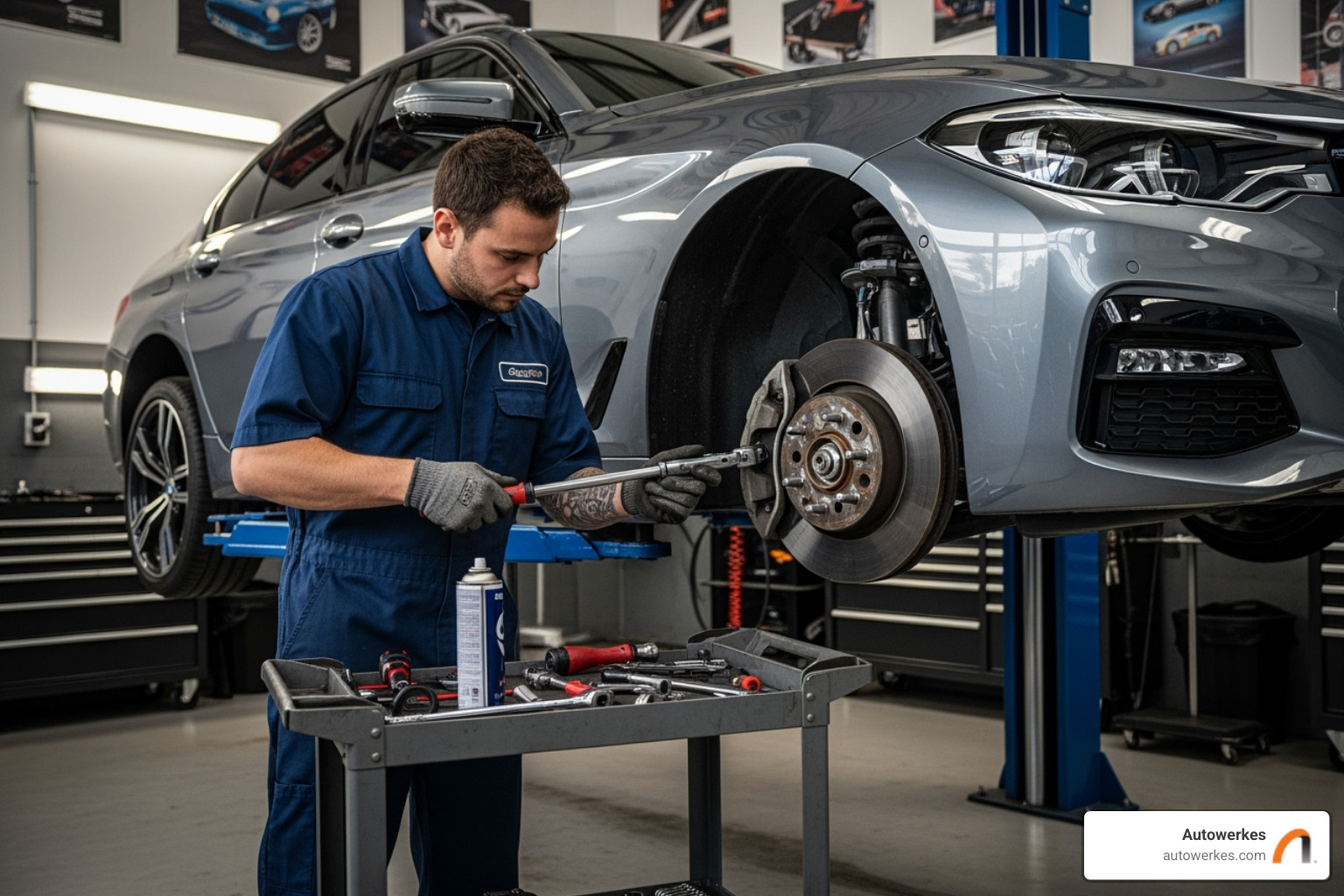
Your braking system is too important to compromise. For expert service in Huntington Beach, Newport Beach, Fountain Valley, Palos Verdes, Manhattan Beach, Los Angeles, Irvine, Mission Viejo, Laguna Beach, or San Diego, trust the specialists at Autowerkes.
Ready to schedule your BMW brake fluid change or have questions about your braking system? We're here to get you back on the road with confidence.

.svg)



